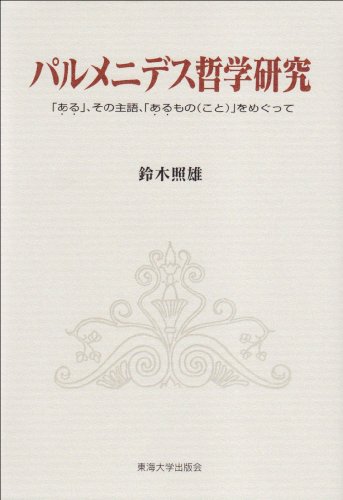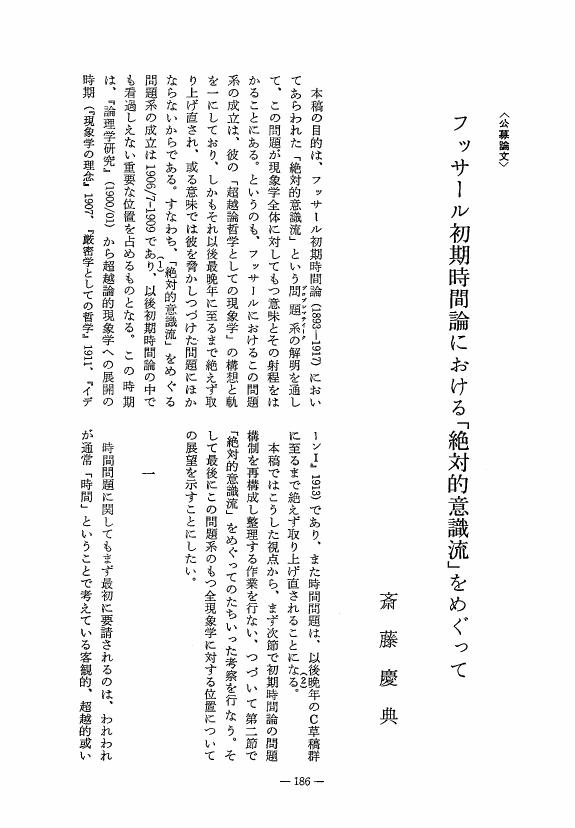1 0 0 0 OA コギトと超越論的主観性
- 著者
- 斎藤 慶典
- 出版者
- 日本哲学会
- 雑誌
- 哲学 (ISSN:03873358)
- 巻号頁・発行日
- vol.1997, no.48, pp.1-18, 1997-05-01 (Released:2010-01-20)
- 参考文献数
- 6
古代から現代にいたるまでの哲学は、自我ないし人格の問題を、それぞれの時代に応じて、その時代に特有の概念装置を通して、思い考えかつ生きていた。自我・人格は、ときに「魂」であり、「小宇宙」であり、また「社会契約」の主体であり、「知覚の束」であった等々。自我の同一性という古くまた新しい問題をめぐって、「実体」「因果」「反省」等の概念が交錯する。これらの思考の遺産を、今日的状況の中から、 (ときに東洋的思考の伝統との接点をさぐりながら) 、あらためて根底にたちかえって検討してみたい。
1 0 0 0 IR 和辻哲郎の言語哲学 : 「日本語で哲学する」ことの前提認識をめぐって
- 著者
- 飯嶋 裕治
- 出版者
- 九州大学哲学会
- 雑誌
- 哲学論文集 (ISSN:0285774X)
- 巻号頁・発行日
- vol.51, pp.61-84, 2015-09
1 0 0 0 IR 哲学と二つの言語
- 著者
- 清水 真木
- 出版者
- 明治大学教養論集刊行会
- 雑誌
- 明治大学教養論集 (ISSN:03896005)
- 巻号頁・発行日
- no.436, pp.1-19, 2008-09
日本語の「哲学」という名詞、そして、明治以降、「哲学」という言葉によって日本語に置き換えられてきた西洋近代各国語の語彙に含まれるphilosophy、philosophieなどの言葉が使われる文脈は、大きく二つに分かたれる。すなわち、一方において、「哲学」は、専門的な学問分野としての哲学を指し示すために使用される。しかし、他方において、「哲学」という言葉が、通俗的な意味を担う場面もまた、少なくはない。たとえば、「あの人には哲学がない」「松下幸之助の経営哲学」などの表現に含まれる「哲学」という言葉は、哲学史を構成する哲学、つまり、学問としての哲学、あるいは学問的であることを目指す活動としての哲学を意味するものではない。
1 0 0 0 IR 言語と哲学--日本語の哲学的効用
- 著者
- 雨宮 民雄 Tamio Amemiya
- 出版者
- 東京海洋大学
- 雑誌
- 東京海洋大学研究報告 (ISSN:18800912)
- 巻号頁・発行日
- no.3, pp.5-12, 2007-03
東京海洋大学海洋科学部海洋政策文化学科
1 0 0 0 IR 日本語の七層と現象学的優位 --日本語で哲学する--(前)
- 著者
- 平田 俊博
- 出版者
- 京都大学大学院文学研究科日本哲学史研究室
- 雑誌
- 日本哲学史研究 : 京都大学大学院文学研究科日本哲学史研究室紀要 = Studies in Japanese Philosophy : Nihon Tetsugakushi Kenkyu
- 巻号頁・発行日
- no.2, pp.1-19, 2005-09-05
1 0 0 0 IR 日本語と哲学--日本語の形而上学的性格
- 著者
- 奥村 一郎
- 出版者
- 上智大学神学会
- 雑誌
- カトリック研究 (ISSN:03873005)
- 巻号頁・発行日
- no.30, pp.p251-280, 1976-12
1 0 0 0 IR 日本語における哲学的思考の可能性について (1)
- 著者
- 下野 正俊
- 出版者
- 国士舘大学哲学会
- 雑誌
- 国士舘哲学 (ISSN:13432389)
- 巻号頁・発行日
- no.2, 1998-03
1 0 0 0 芸術解釈のアポリア : 芸術哲学の可能性への問
- 著者
- 岩城 見一
- 出版者
- 京都大学
- 雑誌
- 研究紀要 (ISSN:03897508)
- 巻号頁・発行日
- vol.12, pp.31-59, 1991-03-29
1 0 0 0 ヘーゲルの芸術終焉論―瀕死の哲学的美学の興奮剤 (?) ―
- 著者
- 岩城 見一
- 出版者
- 日本ヘーゲル学会
- 雑誌
- ヘーゲル哲学研究 (ISSN:13423703)
- 巻号頁・発行日
- vol.1998, no.4, pp.23-33, 1998
1 0 0 0 形象世界の論理 : 芸術哲学の可能性への問い (2)
- 著者
- 岩城 見一
- 出版者
- 京都大学
- 雑誌
- 研究紀要 (ISSN:03897508)
- 巻号頁・発行日
- vol.14, pp.1-22, 1993-06-30
1 0 0 0 OA 芸者哲学 : 皮肉諷刺
1 0 0 0 初期ギリシア哲学者の実在観
- 著者
- 小坂 国継
- 出版者
- 日本大学経済学部
- 雑誌
- 研究紀要. 一般教育・外国語・保健体育 = Research bulletin. 日本大学経済学部 編 (ISSN:13428616)
- 巻号頁・発行日
- no.76, pp.25-46, 2014-10
1 0 0 0 日本民法学における「イデオロギー」と「思想」
- 著者
- 星野 英一
- 出版者
- 日本法哲学会
- 雑誌
- 法哲学年報 (ISSN:03872890)
- 巻号頁・発行日
- no.1982, pp.81-102, 1983
- 著者
- 香春 Xiangchun
- 出版者
- 名古屋大学人文学研究科
- 雑誌
- 名古屋大学人文学研究論集 (ISSN:2433233X)
- 巻号頁・発行日
- no.3, pp.221-250, 2020-03-31
Our aim in this paper is to investigate the core thought of "Happiness" (eudaimonia) in Aristotle's Ethica Nicomachea in order to elucidate the significance of his ethical thought in the age of globalization. Against common thought that the core opinion of Aristotle's ethics is rather 'communitarian', we have tried to interpret his thought as a kind of ethical theory that could fit the multicultural situation of our age. He characterized the notion of 'Happiness' as a kind of human 'proper' activity which would be controlled by human 'reason' (logos). He situated Happiness in the midst of 'our own authentic activity'. We drew a distinction between the 'Goodness for human being' and 'Goodness as a human being', both of which are expressed as "the human goodness". The former is Happiness and the latter is "virtue", and then the main problem of his ethics can be formulated as follows; how we realize our own happiness through 'virtue' as our own activity. According to our interpretation, the concept of his happiness as the final end of our life can be interpreted as ethically connected with Kantian notion of dignity of person as "Zweck an sich". We pointed out one of the most important features of Aristotle's ethics, namely that his ethical theory is very practical one. Aristotle suggested a real method of becoming to be virtuous through real exercise of accustoming oneself to do good things and to do well in moral sense. We can conclude that Aristotelian thought of morals contains in itself a theory of the real method through which we can become a 'good or virtuous person' and therefore we can assert that his ethical theory has kept its power as the most persuasive one even now.
1 0 0 0 IR 応用政治哲学の一試論 : 分析的平等論と教育政策への示唆
- 著者
- 松元 雅和
- 出版者
- 島根大学教育学部
- 雑誌
- 島根大学教育学部紀要 (ISSN:18808581)
- 巻号頁・発行日
- no.45, pp.83-93, 2011-12-28
平等論は、現代英米圏の分析的政治哲学においてもっとも発展しているトピックのひとつである。しかしながら、これらの理論的展開が、実践的にどのような含意をもつかは必ずしも明確ではない。むしろ、理論の精緻化が進むにつれて、その成果が喫緊の政策課題から離れてしまうことも往々にしてありうる。そこで本稿では、分配財としての教育を事例として、分析的平等論の理論的展開から得られる実践的意義を示してみたい。すなわち、本稿の目的は、平等論そのものを分析・評価することではなく、政治哲学としての平等論の一部を今日の公共政策へと接続する経路を示すことである。本稿の構成は以下の通りである。はじめに、今日盛んに議論されている教育の自由化の問題を取り上げ(第2節)、次いでこの問題に対して応用する、分析的平等論における平等主義と優先主義の区別を紹介する(第3節)。さらには、A・スウィフトの議論を参照に、「位置財」という観念を導入しつつ、教育を横並び化するレベル下げが正当化されうることを指摘し(第4節)、同時にその制約についても指摘する(第5節)。最後に、実証的知見を踏まえながら、以上の議論が近年の教育改革論議(特に学校選択制の是非)に対して与える示唆について論じてみたい(第6節)。
1 0 0 0 IR なぜシャーマンと絵とダンスが哲学の問題になるのか?
- 著者
- 田村 均
- 出版者
- 名古屋大学哲学研究室
- 雑誌
- 哲学フォーラム
- 巻号頁・発行日
- no.10, pp.1-8, 2013
1 0 0 0 OA フッサール初期時間論における「絶対的意識流」をめぐって
- 著者
- 斎藤 慶典
- 出版者
- 日本哲学会
- 雑誌
- 哲学 (ISSN:03873358)
- 巻号頁・発行日
- vol.1987, no.37, pp.186-198, 1987-05-01 (Released:2009-07-23)
1 0 0 0 IR 『ラクシュミー・タントラ』における創造説とグナ(性質)
- 著者
- 三澤 祐嗣
- 出版者
- 東洋大学国際哲学研究センター
- 雑誌
- 国際哲学研究 = Journal of international philosophy (ISSN:21868581)
- 巻号頁・発行日
- no.7, pp.189-200, 2018-03
Lakṣmītantra is one of the major texts of the Pāñcarātra sect and is estimated to have been compiled and edited between the ninth and twelfth centuries. The major t hemes o f t he t ext i s t he p hilosophy and cosmogony that are unique to the Pāñcarātra sect, and the text has widely taken in various thoughts to produce eclectic thoughts.According to the creation theory of Lakṣmītantra, as i n the c ase o f o ther texts b y t he Pāñcarātra sect, divine creation is seen as the "pure creation" (śuddhasṛṣṭi) and the creation of the material world is the "non-pure creation" (śuddhetarasṛṣṭi). The metaphysical development of various principles, and mythic creation is explained in a complex and intertwined manner. In this theory, something called guṇa appears from time to time. The term, which means attributes or nature, particularly when i t i s r eferred to a s t hree kinds of guṇa as seen in the Samkhya school, is explained as something like constitutive elements which diversify the world as well as an attribute which governs the mind. On the other hand, in Lakṣmītantra, it appears in various places in the creation theory and has different meanings according to the phase in which it appears.The present article identifies and classifies guṇa-s that appear in the creation theory in Lakṣmītantra. Guṇa-s can be roughly divided into "mythic six guṇa-s" and "what is made up with three guṇa-s." The former is related to the "pure creation" and the latter the "non-pure creation." Although it appears irregular at first glance, the article has shown that each guṇa is relayed and merged in a complex manner.
1 0 0 0 IR 『ラクシュミー・タントラ』における創造説とグナ(性質)について
- 著者
- 三澤 祐嗣
- 出版者
- 東洋大学国際哲学研究センター
- 雑誌
- 国際哲学研究 = Journal of international philosophy (ISSN:21868581)
- 巻号頁・発行日
- no.6, pp.229-238, 2017-03

